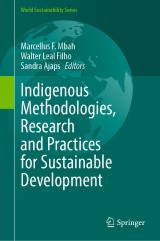Details

Indigenous Methodologies, Research and Practices for Sustainable Development
World Sustainability Series
|
149,79 € |
|
| Verlag: | Springer |
| Format: | |
| Veröffentl.: | 21.10.2022 |
| ISBN/EAN: | 9783031123269 |
| Sprache: | englisch |
Dieses eBook enthält ein Wasserzeichen.
Beschreibungen
This book states that whilst academic research has long been grounded on the idea of western or scientific epistemologies, this often does not capture the uniqueness of Indigenous contexts, and particularly as it relates to the achievement of the United Nations Sustainable Development Goals (SDGs). The SDGs were announced in 2015, accompanied by 17 goals and 169 targets. These goals are the means through which Agenda 2030 for sustainable development is to be pursued and realised over the next 15 years, and the contributions of Indigenous peoples are essential to achieving these goals.<div><br></div><div>Indigenous peoples can be found in practically every region of the world, living on ancestral homelands in major cities, rainforests, mountain regions, desert plains, the arctic, and small Pacific Islands. Their languages, knowledges, and values are rooted in the landscapes and natural resources within their territories.<br></div><div><br></div><div>However, many Indigenous peoples arenow minorities within their homelands and globally, and there is a dearth of research based on Indigenous epistemologies and methodologies. Furthermore, academic research on Indigenous peoples is typically based on western lenses. Thus, the paucity of Indigenous methodologies within mainstream research discourses present challenges for implementing practical research designs and interpretations that can address epistemological distinctiveness within Indigenous communities.<br></div><div><br></div><div>There is therefore the need to articulate, as well as bring to the nexus of research aimed at fostering sustainable development, a decolonising perspective in research design and practice.<br></div><div><br></div><div>This is what this book wants to achieve. The contributions critically reflect on Indigenous approaches to research design and implementation, towards achieving the sustainable development goals, as well as the associated challenges and opportunities. The contributions also advanced knowledge, theory, and practice of Indigenous methodologies for sustainable development.<br></div>
Unpacking Key Terms: Sustainable Development, Indigenous Knowledges, Methodology.- Decolonisation of Research Methodologies Toward Sustainable Development in Indigenous Settings.- On the Impossibility of Instrumentalising Indigenous Methodologies for the Sustainable Development Agenda.- Deconstructing Community-Based Research for Sustainable Development: The Role of Indigenous Knowledge Holders.- The Iloco Ammu as Indigenous Research Ontology, Epistemology, and Methodology.
This book states that whilst academic research has long been grounded on the idea of western or scientific epistemologies, this often does not capture the uniqueness of Indigenous contexts, and particularly as it relates to the achievement of the United Nations Sustainable Development Goals (SDGs). The SDGs were announced in 2015, accompanied by 17 goals and 169 targets. These goals are the means through which Agenda 2030 for sustainable development is to be pursued and realised over the next 15 years, and the contributions of Indigenous peoples are essential to achieving these goals.<div><br></div><div>Indigenous peoples can be found in practically every region of the world, living on ancestral homelands in major cities, rainforests, mountain regions, desert plains, the arctic, and small Pacific Islands. Their languages, knowledges, and values are rooted in the landscapes and natural resources within their territories.<br></div><div><br></div><div>However, many Indigenous peoples arenow minorities within their homelands and globally, and there is a dearth of research based on Indigenous epistemologies and methodologies. Furthermore, academic research on Indigenous peoples is typically based on western lenses. Thus, the paucity of Indigenous methodologies within mainstream research discourses present challenges for implementing practical research designs and interpretations that can address epistemological distinctiveness within Indigenous communities.<br></div><div><br></div><div>There is therefore the need to articulate, as well as bring to the nexus of research aimed at fostering sustainable development, a decolonising perspective in research design and practice.<br></div><div><br></div><div>This is what this book wants to achieve. The contributions critically reflect on Indigenous approaches to research design and implementation, towards achieving the sustainable development goals, as well as the associated challenges and opportunities. The contributions also advanced knowledge, theory, and practice of Indigenous methodologies for sustainable development.</div>
Gives interdisciplinary outputs on best practices on indigenous knowledge and sustainable development Provides documentation of projects, institutional policies, innovative methods and tools, and research outputs Covers a wide range of disciplines
Diese Produkte könnten Sie auch interessieren:

Decision Support Systems for Risk-Based Management of Contaminated Sites

von: Antonio Marcomini, Glenn Walter Suter II, Andrea Critto

96,29 €

Dynamics of Mercury Pollution on Regional and Global Scales

von: Nicola Pirrone, Kathryn R. Mahaffey

149,79 €














